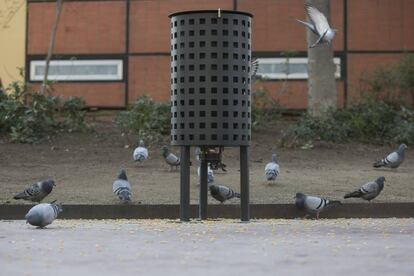Barcelona to feed pigeons contraceptives in bid to slash numbers
Special dispensers throughout city will release treated maize each morning

At first glance, they look like smart new garbage bins, but the 40 black metal cylinders that have appeared in parks throughout central Barcelona contain bird seed spiked with contraceptives. The local council is hoping that the measure will help to reduce the pigeon population in the Catalan capital.

Until now, Barcelona City Hall has applied periodic culls, capturing and then killing the birds, but it has decided to take a more humane and practical approach, which it hopes will cut numbers from around 85,000.
On Tuesday, the council, which describes itself as “animal friendly,” unveiled its plan, calling it “a clear and decisive bid for ethical control of pigeon populations,” taking its lead from the Italian city of Genoa.
City Hall says pigeons affect health, urban mobility, public spaces and vegetation
City Hall hopes to reduce the population by around 20% in the first year of the contraceptive scheme, with overall numbers falling by 80% in four to five years. The cost of the project will be €250,000 a year, but authorities in the regional capital say it will be cheaper in the long term than the methods used up to now, while money will also be saved on cleaning public buildings spattered with corrosive pigeon droppings.
Francesc Ximeno, Barcelona’s environmental commissioner, explained that the dispensers will release maize at 8am each day, when pigeons are reportedly most hungry. Each dispenser, distributed throughout 10 districts, will feed a local pigeon colony. The maize, which is large enough not to be edible for other species, is coated with nicarbazin, which limits ovulation in females and also affects sperm in males.
Barcelona is taking its lead from the Italian city of Genoa
City Hall officials say that pigeons are not only a nuisance to humans and other animals, but “can affect health, urban mobility, public spaces and vegetation.” Last month, Catalonia’s Supreme Court accepted a claim by a former tourist guide who said that she had contracted pulmonary fibrosis as a result of being constantly exposed to pigeon droppings in Barcelona’s Plaza de Catalonia.
Barcelona also faces a threat from another avian species, the monk parakeet, numbers of which have grown sharply over recent years. So far, no measures have been discussed on how to deal with the noisy birds.
English version by Nick Lyne.
Tu suscripción se está usando en otro dispositivo
¿Quieres añadir otro usuario a tu suscripción?
Si continúas leyendo en este dispositivo, no se podrá leer en el otro.
FlechaTu suscripción se está usando en otro dispositivo y solo puedes acceder a EL PAÍS desde un dispositivo a la vez.
Si quieres compartir tu cuenta, cambia tu suscripción a la modalidad Premium, así podrás añadir otro usuario. Cada uno accederá con su propia cuenta de email, lo que os permitirá personalizar vuestra experiencia en EL PAÍS.
¿Tienes una suscripción de empresa? Accede aquí para contratar más cuentas.
En el caso de no saber quién está usando tu cuenta, te recomendamos cambiar tu contraseña aquí.
Si decides continuar compartiendo tu cuenta, este mensaje se mostrará en tu dispositivo y en el de la otra persona que está usando tu cuenta de forma indefinida, afectando a tu experiencia de lectura. Puedes consultar aquí los términos y condiciones de la suscripción digital.








































